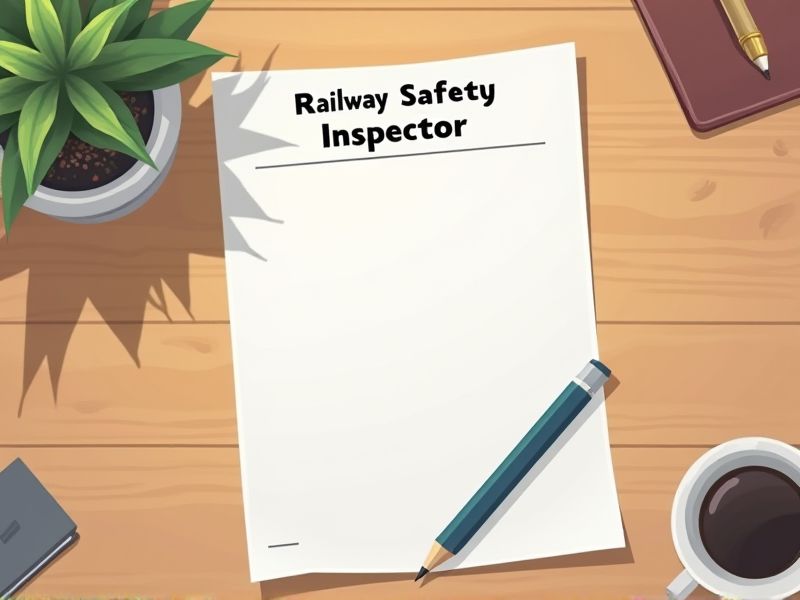
Railway Safety Inspectors are responsible for ensuring compliance with safety standards, which mitigates potential risks and hazards on the rail network. Obtaining specific certifications equips inspectors with crucial technical expertise and enhances their understanding of regulatory requirements. These credentials also validate an inspector's capability to identify and rectify safety issues effectively. Here are some key certifications relevant to a Railway Safety Inspector's role.
FRA Rail Safety Inspector Certification
FRA Rail Safety Inspector Certification ensures that inspectors possess a comprehensive understanding of federal safety standards and regulations. Certification provides the necessary training to identify potential hazards and enforce compliance, reducing the risk of accidents. It instills confidence in both the public and industry stakeholders that inspections are conducted consistently and thoroughly. The program also keeps inspectors updated on the latest safety technologies and practices, promoting continual improvement in railway safety.
Certified Rail Safety Auditor
Certified Rail Safety Auditors enhance the credibility and reliability of railway safety inspections by ensuring thorough knowledge and adherence to industry standards. Their certification demonstrates proficiency in identifying and mitigating potential safety risks, thereby increasing passenger and operational safety. The complex nature of railway systems requires specialized expertise to evaluate structural and operational components, which certified auditors provide. Continuous advancements in rail technology demand up-to-date safety practices and assessments, a need fulfilled by certified professionals.
Transportation Safety and Compliance Certification
Transportation Safety and Compliance Certification is needed for a Railway Safety Inspector to ensure adherence to federal and state regulations, which reduces the risk of accidents. Understanding safety standards enables inspectors to effectively assess and mitigate potential hazards in railway operations. The certification provides necessary skills for identifying and resolving safety non-compliances, leading to safer rail environments. Rigorous training and assessment validate the inspector's competence, promoting public trust in railway safety management.
ISO 45001 Occupational Health and Safety Certification
ISO 45001 certification ensures a systematic framework for managing safety risks, crucial for railway safety inspectors who deal with myriad workplace hazards. This certification reinforces compliance with international safety standards, helping inspectors uphold rigorous safety measures. By fostering a culture of proactive risk management, ISO 45001 minimizes accident occurrences, leading to safer railway operations. It strengthens stakeholder confidence by demonstrating a commitment to high standards of occupational health and safety.
OSHA Safety Certification
OSHA Safety Certification equips Railway Safety Inspectors with vital knowledge about workplace hazards, leading to improved accident prevention strategies. This certification ensures inspectors understand compliance standards, fostering a safer environment for both workers and passengers. Possessing OSHA certification enhances the credibility and authority of inspectors, ensuring their recommendations are taken seriously. The certification also ensures inspectors are well-versed in emergency response protocols, reducing potential incident impacts on the railway system.
Risk Management in Transportation Certification
Risk Management in Transportation Certification equips railway safety inspectors with the necessary skills to identify and mitigate potential hazards effectively. By understanding risk management principles, inspectors can implement preventive measures that reduce accident rates and enhance operational safety. Certification ensures that inspectors are well-versed in industry standards, fostering a culture of safety compliance and accountability. Well-trained inspectors contribute to maintaining public trust and improving overall railway safety performance.
Hazardous Materials Transportation Certification
Ensuring a Railway Safety Inspector holds a Hazardous Materials Transportation Certification guarantees they understand the complex regulations that govern hazardous materials. This knowledge enables them to identify risks accurately during transportation assessments, reducing the likelihood of accidents. With certification, inspectors can effectively enforce compliance with safety standards, thus mitigating potential environmental and public health threats. Proficiency in hazardous materials management also helps anticipate and prevent incidents, promoting safer rail operations.
Railway Operations and Maintenance Safety Certification
Railway Operations and Maintenance Safety Certification is essential for Railway Safety Inspectors to ensure they have the necessary expertise to identify and mitigate potential hazards. This certification verifies that inspectors understand regulatory standards and safety protocols critical in safeguarding passengers and railway personnel. It guides the effective evaluation of operational procedures, enhancing the reliability of railway services. Inadequate safety oversight can cause accidents, leading to potential loss of life and economic repercussions.
First Aid and CPR Certification for Transportation
Railway safety inspectors encounter emergency situations, where immediate response can prevent injuries from worsening. First Aid and CPR certification equips inspectors with essential skills to address medical emergencies effectively on-site. This training ensures a rapid response during accidents, enhancing passenger and crew safety. Insights from certified inspectors contribute to overall railway safety strategies and compliance with safety regulations.
Safety Management Systems (SMS) Certification
Safety Management Systems (SMS) Certification for Railway Safety Inspectors ensures adherence to standardized safety protocols, reducing the likelihood of accidents. Compliance with SMS fosters a safety culture among inspectors, improving their ability to identify and mitigate potential hazards effectively. The certification acts as a validation of inspectors' skills, reinforcing confidence among stakeholders and passengers regarding railway safety. By requiring SMS certification, railway organizations can demonstrate due diligence, potentially reducing liability and averting costly legal implications.
Summary
As a Railway Safety Inspector obtains certifications, you can expect enhanced expertise in safety protocols. This advanced knowledge enhances your ability to identify and mitigate risks on the railway. Certification often leads to increased credibility, fostering trust among colleagues and stakeholders. Such qualifications might also open doors to career advancements and leadership roles in safety management.
